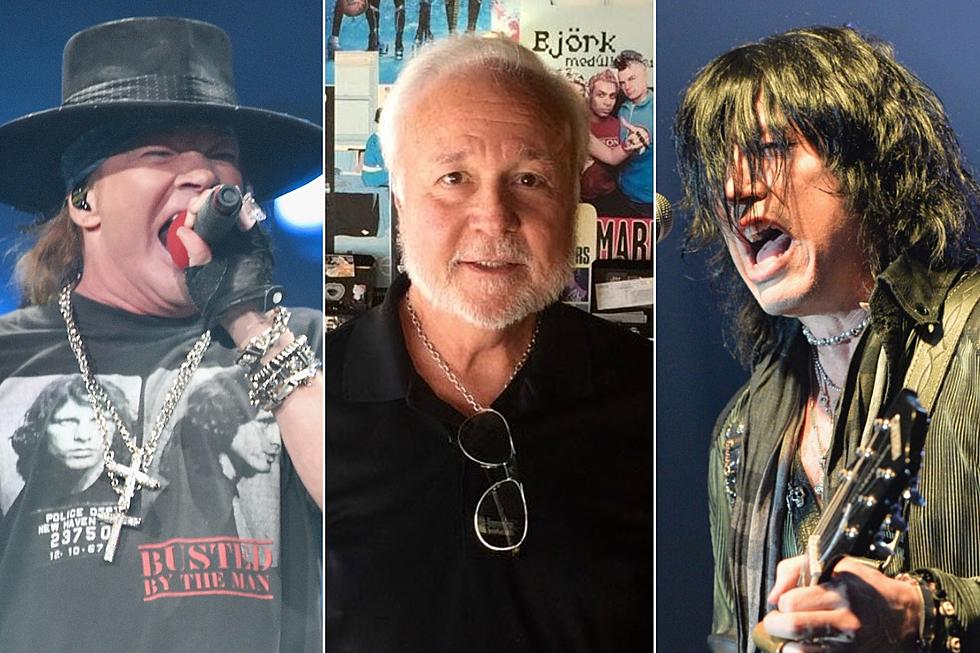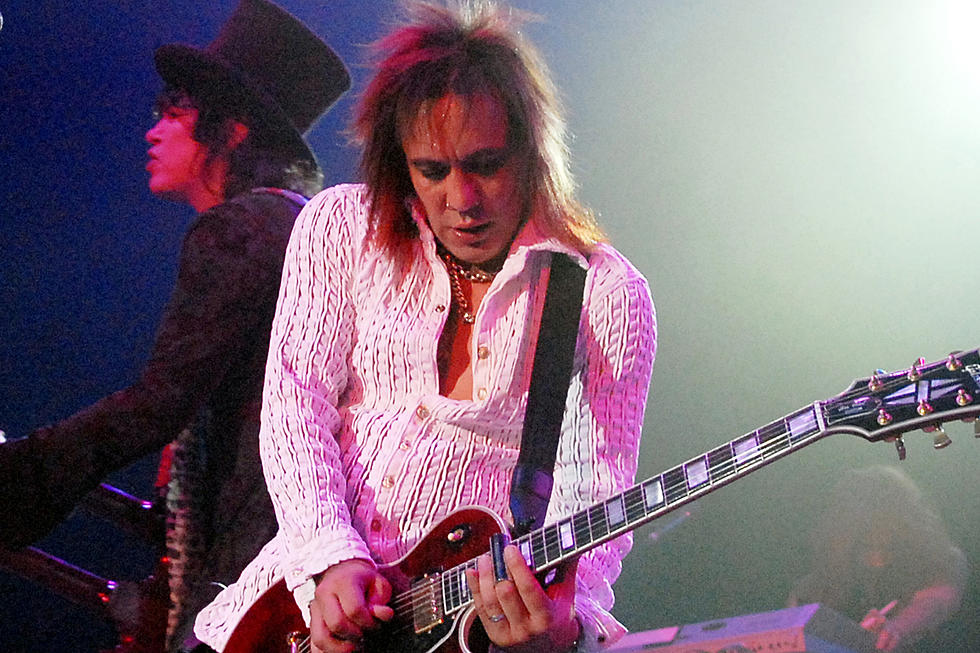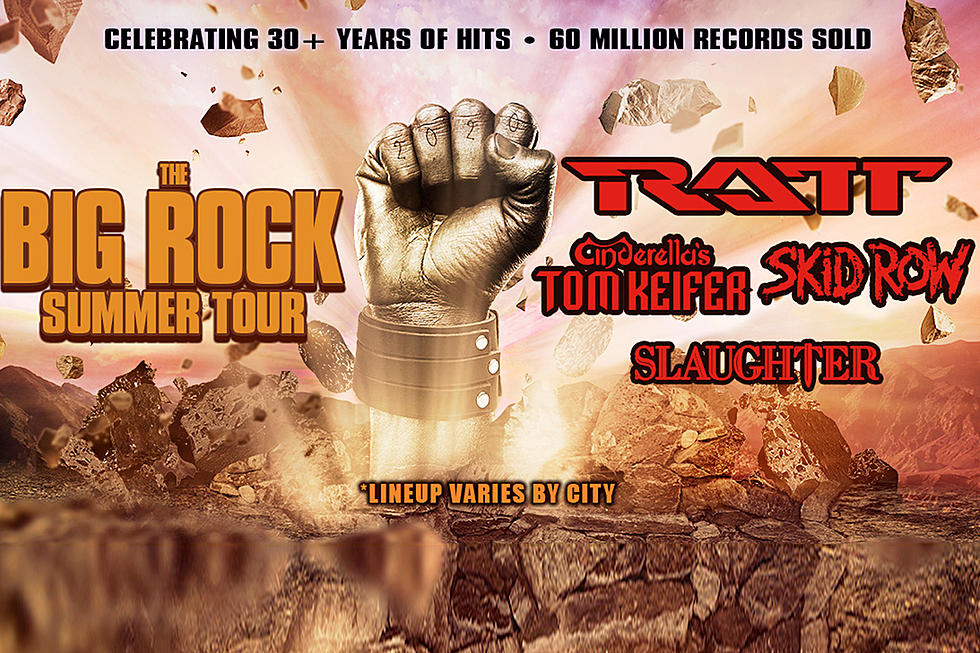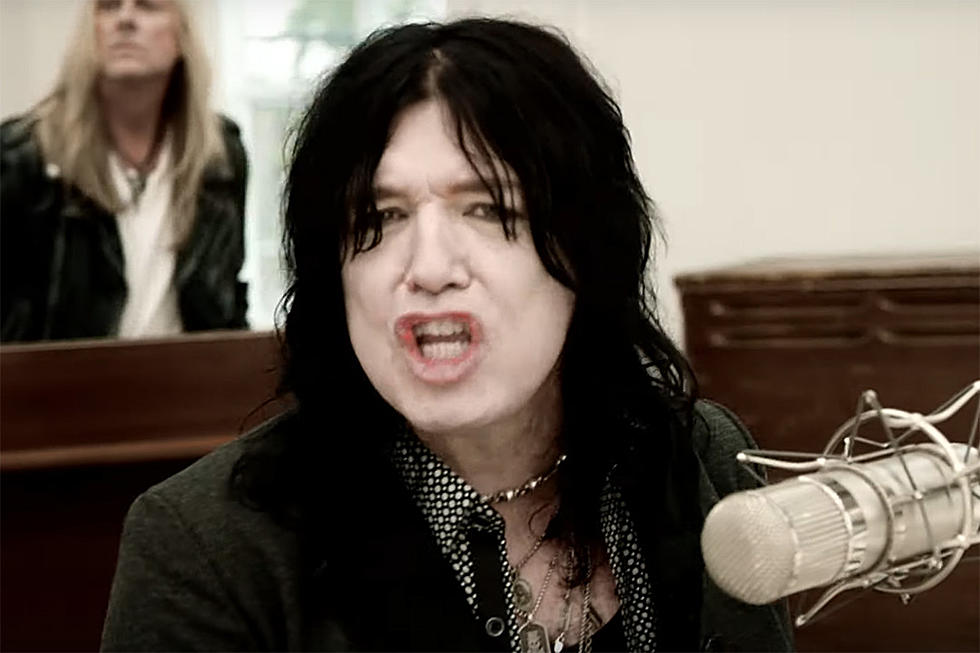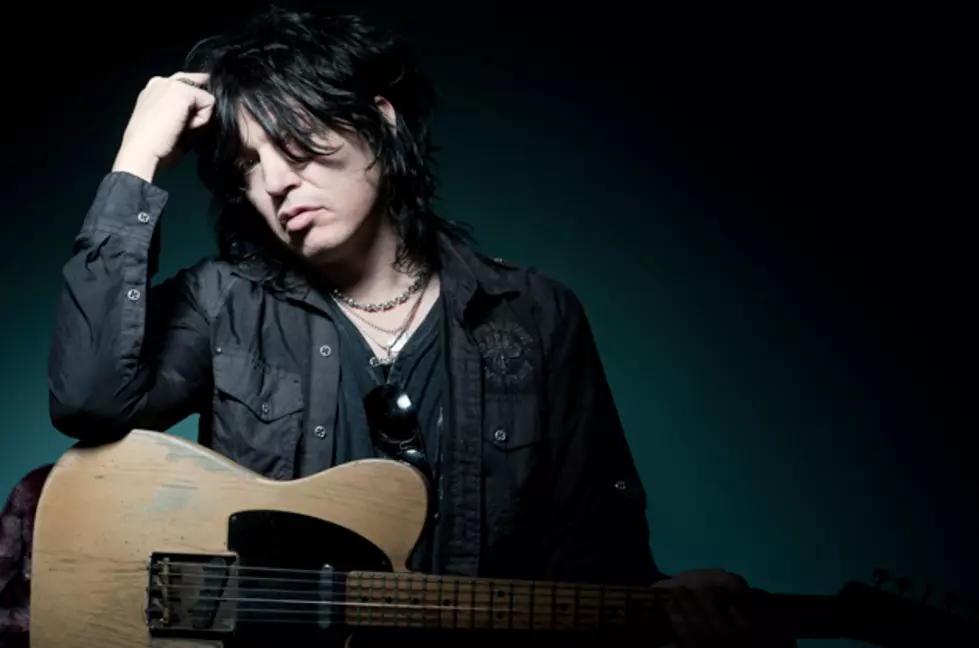
Tom Keifer on Solo Album + Cinderella’s Future: ‘Never Say Never’
For Cinderella frontman Tom Keifer, the title of his new album, ‘The Way Life Goes,’ has a lot of significance. It’s been a strenuous road to recovery for Keifer since the early ‘90s, when doctors told him that he would probably never sing again as the result of a paralyzed left vocal cord. If there was a light at the end of the tunnel, it would take a lot of hard work to get there.
Keifer took the hand which he had been dealt in stride and found his way back to the stage with Cinderella and eventually to the recording studio. Nearly 10 years later, we’re finally hearing the results on ‘The Way Life Goes,’ Keifer's debut solo album, which came out this week.
Keifer's struggle and subsequent creative rebirth are captured in the new songs, and his familiar husky vocals have never sounded better. The Pennsylvania-born rocker spent the early part of this year on the road previewing material from the new album; now that it's out, he’s back out on the road for a second round of tour dates.
We caught up with Keifer to talk about the new album and the possibility of new material from Cinderella down the line.
You know, it’s good to hear the vocal sounds of Tom Keifer that we know and love so well.
Oh, thank you, man.
That’s no small feat, knowing in brief what you’ve been through. What did it take to get back to where you are now vocally?
Well, you know, it’s a diagnosis that unfortunately you’re never really cured of because it’s neurological. There’s not a medicine or a surgery that can fix a paralysis, or a partial paralysis, in my case.
So it’s therapy, and I was told when I was diagnosed with this that I would never sing again, or at least not sing the way that I used to. And they said if you have any shot at it at all, it would be to work starting at the speech level with speech pathologists, which I did for a number of years, and then work your way up into being able to hold pitches and working with vocal coaches and try and retrain them to do what they’re supposed to do. It’s an ongoing process [and] a roller-coaster ride.
I have ups and downs since the early ‘90s, when I was diagnosed with this. Because it’s a weakness that’s been there kind of inherently, I injure myself a lot. I’ve had hemorrhages and all kinds of things that had to be corrected surgically. I’ve had six surgeries over the years. So it’s an ongoing battle. I will say that in the last four years, I’ve been on an upswing because I met a coach out in Los Angeles named Ron Anderson who is probably the best coach I’ve ever worked with.
I’ve worked with many, many [of them] over the years, and he taught me a lot of things about singing and the voice that have really, really helped me to strengthen this situation. And I started working with him in 2009, and over the last few years, I would say that it gets stronger and stronger every year. I wouldn’t say that I’m out of the woods, and I don’t think I’ll ever be out of the woods, but it’s been the most stable and strongest [that it’s been] in the last three years.
For you yourself, knowing how you were in your prime, what’s your stamina like these days when it comes to doing a show compared to how it was in the old days. Did that part of things change?
You know, Cinderella used to do two-hour shows back in the day. We’ve cut that back. We do about an hour and 15 or an hour and 20 [-minute sets] usually when we go out, and that’s about it for me. Actually on this tour, I’ve heard reports that we’ve been doing upwards of 90 minutes, so maybe something is getting a little stronger. Certainly, I’d love to sing all night, and I want to give the fans as much as I can, but I also want to give them quality, so if there’s a point in the show [where that isn’t there], there’s no point in doing two hours if the last 30 minutes is just going to be a bunch of crap, right? So I always try to pace the sets where I can sing well.
With your vocal situation, does it actually help you to be more active vocally and doing shows, or does it help to space things out. How do you manage that piece of it?
I’ve always been the kind of singer that [after] multiple nights in a row, provided that I am singing properly and not straining myself and can hear well, I usually get stronger as the nights go on. It was like that back in the day, and it’s still kind of like that since I’ve had this condition. When I’m starting a tour, I have to be careful to not jump right into multiple nights. I need to build it up. But once I have it built up, three nights in a row and four nights even, sometimes I get stronger. But then there’s a point where I need rest.
When did you really seriously start working on the material for this record?
I guess “serious” would be when we actually started cutting tracks, which was in 2003. And that’s when it was like definitively, Well, let’s make a record. I’d been writing for years with the idea of a solo record in mind, but it kept getting put on the back burner. I think I started working on it in 2003 because Cinderella was tied up in a lawsuit with a record deal that had gone south, and the only thing that we could really do was tour. So with the hands being tied in that respect, with Cinderella in terms of recording, everybody started doing their own projects, and I started doing mine, and mine took a little bit longer -- about 10 years! But we actually started recording it in 2003.
Was there a particular song that signified that the project was heading somewhere toward being an album?
No, before we started cutting the tracks, I think we looked at a big pile of songs that had been written over the years and tried to pick a group of them that felt like a record --something cohesive and something that had dynamics. You know, I always like to make records that have a range of sounds and emotions. So this one ranges from acoustic and organic to real hard-driving rock. I just tried to make that song selection where -- in my mind anyway, since I hadn’t heard any of it yet recorded -- it would feel like a record. And then we just started cutting tracks.
How many songs did you start out with?
There was probably 30 or 40 songs. I never really counted them. I had been writing for a while.
What was the recording process like?
It was two or three tracks at a time. We went in and worked with the rhythm section and then overdubbed to those [tracks]. There were some rough vocals and guitars that I had put down for them to play to, because I produced the record with my wife, Savannah, and a good friend of ours from Nashville, Chuck Turner, who is a great engineer and producer. I had some scratch stuff on tape so that I could sit at the console and listen to the rhythm section play, since I was involved with the production of it. It’s kind of a cool way to work to be able to do that. It gives them a guide to work to, and then we built from that.
Who is playing with you on this record?
The drummer was Greg Morrow, the bass player was Michael Rose. I did probably 95 percent of the guitars, but I did have a couple other guitar [players]. A guy from Nashville named Pat Buchanan played guitar on some of the tracks, and Gary Burnett has a guitar solo on one of the tracks. Tommy Heralls did most of the keyboards -- I did a couple, but he did most of the cool [parts featuring] like B-3 and piano and stuff. My wife Savannah not only co-produced and co-wrote a lot of the songs, she [also] sang some stuff on the record, on backgrounds.
Are any of these guys out with you on the road for this tour?
Savannah’s here. She’s singing on a couple of songs that she recorded with me, but the touring band is different than what I used in the studio.
Who is out with you on the road?
Paul Simmons on the drums, Bill Mercer on bass, Tony Higbee on guitar and Paul Taylor on keyboards.
‘Solid Ground’ was the first single for rock radio. Can you talk about that one a little bit?
That was written by Savannah and myself. It’s kind of like that age-old saying that “life is a journey, not a destination.” To me, that’s what that lyric is about. We always seem like we’re looking for this thing that’s going to make us feel like we’ve arrived or that we’re whole or whatever, and life’s just not like that. Life continues on, and it is a journey. So to me, that’s what that lyric is about. It’s a little autobiographical, I guess.
There seems to be a fair amount of that on this record. Have you found yourself writing a lot from the heart in the past? Has that been a trait present in a lot of the stuff that you wrote before now with Cinderella?
Well yeah, that’s where I always try to write from. The whole process of making a record, to me, starts with a song. Because there’s no point in going into the studio to record unless you’ve got a great song. Songs start, for me, usually with a lyric idea, and those inspirations come from life, whether it’s something that I’ve been through or something that other people are going through.
All of my heroes and influences were people wrote about real things, because their influences were American roots music, like country and blues and gospel and R&B. I’m talking about people like the [Rolling] Stones, and I love the Eagles and [Lynyrd] Skynyrd and Fleetwood Mac and Aerosmith and Janis Joplin and Bad Company -- all of that great music from the ‘70s. And that’s where I learned how to write songs and how to sing, so that’s where all my inspiration comes from.
Who were the specific artists and songwriters that really gave you something important that you held on to, as far as how you write songs today? As far as something that you heard in what they were doing that influenced what you’re doing now.
I think that one of the greatest lyricists of all time is Mick Jagger. He’s probably one of my favorites. You can’t go wrong with those songs, and they were a huge inspiration to me. I think I mentioned that the period of time that I grew up in high school and was first starting to play guitar, there was an amazing amount of talented artists and bands.
The Eagles, I mean, if we talk about songwriting, they were a huge influence -- I loved them, and I still do. But growing up, they were a huge influence on me. And that’s a band that really ran the gamut too, from ‘Take It Easy’ to ‘Life in the Fast Lane.’ They did hard-driving rock like ‘Victim of Love,’ and I always loved those kinds of records. The Stones were the same way, and [Led] Zeppelin was the same way. You know, one track would be some weird folky acoustic Celtic kind of vibe and then the next one would be ‘Whole Lotta Love.’ It’s just what I grew up on.
Did you happen to get a chance to watch the recent Eagles documentary?
I did not.
There was so much cross-pollination going on between groups back then. It was cool hearing Glenn Frey talk about how much he learned about how to write a song, just from hearing Jackson Browne endlessly work on his songs in the apartment below where Glenn was living. I don’t know if the next generation of musicians had the same type of cross-pollination occur that was happening there. But there was definitely an important influence that came from all of that, which made its way into what guys like you and others would do from that point forward.
Certainly in that day and age it was about the song and the lyrics, and that’s interesting that you say that, about them being exposed to each other. You know, that’s one of the reasons I moved to Nashville, because Nashville is all about songwriting. It’s not just country -- everybody there, they like rock and they love when someone like me comes to town and wants to write.
That started in the mid ’90s, because a lot of them do write country every day, but the writers there, they grew up in the same time that I did, and if they can write something rockin’, they jump on it and they love it. It’s all about the song, and most people in Nashville write from that perspective like you were just talking about, the Glenn Frey and the Jackson Browne thing, where it’s really about the song and the lyrics, and that’s where it starts. I’ve always written from that place. Being in Nashville, you’re waking up every day with great songwriters around you. I live with one -- my wife is one of the best songwriters that I’ve ever heard, and she was a staff writer in Nashville on Music Row for years, and she’s also a very talented singer and artist as well.
So not only do I wake up in the same house with her every day, but we’re in a town full of that cross-pollination, where someone’s got a song [and they’re] like, “Check this out!” You’re in that town where everywhere you turn, somebody’s got this amazing song, and it makes you want to be better. So it’s a great place to be.
Have you found yourself writing more as a result of where you are?
I did for a long period of time, yeah. When I first moved to Nashville, it was one of the most creative periods in terms of writing for me, probably ever. I wrote just nonstop from the time I got there in ‘97 right up until about 2002 and then started recording a record, which took up a good bit of my energy at that point.
There’s a good amount of diversity on this record. It goes to some interesting places. For instance, the opening of ‘Ain’t That a Bitch.’ Doing this as a solo record, did that change the definition of the project for you, as far as the types of songs you were writing?
No, I kind of write how I write. With Cinderella, it progressed from ‘Night Songs’ to ‘Heartbreak Station.’ And I think this record is a lot like ‘Heartbreak Station,’ in the sense of the way it’s produced. Because it’s more like a live performance, and it's a much drier mix and more of that timeless [sound] of just the music in your face. There’s not a lot of effects. So I think where I evolved as a writer, or even [with] the production with Cinderella, I think I just picked up there with this record. I don’t think that this is a far stretch from where I ended up with Cinderella.
You know, when we first started in the ‘80s doing ‘Night Songs,’ that record was produced very differently. And honestly, I think Andy Johns did a great job, and he produced the hit record and he did his job. But in retrospect, I think ‘Night Songs’ could have been maybe a little rawer and a little more live feeling the way ‘Heartbreak Station’ was. But we were very green and didn’t know how to get out of the studio what we wanted to get out, and I think it’s a growing process.
This album was a long time coming. With where the industry is now, was there any point where you struggled with the idea of whether it still made sense to put out an album vs. just putting out songs?
Well, I gotta be honest, I just didn’t even think about it. I always made records, and I grew up on records. And when we started this, that was the idea. You know, over the 10-year period that we made this record, we weren’t thinking about markets, trends or technology. To be honest, we went through three different recording formats during the making of this record. That’s how fast technology and trends were moving. So it went from two-inch tape to one of the first digital RADAR machines and then into Pro Tools. We literally saw three different technologies come and go, and we just weren’t thinking about any of it. Obviously, you want your record to be released, but you can’t think about that when you’re making a record. You’ve just gotta think about [the record]. It’s why we produced it independently of a label, with the idea of shopping it to a label eventually, because you know, every artist wants their music to be released and heard. But during the making of it, we didn’t think about any of that. [We were just focused] on making the music.
What are some of the other songs on this album that you’re really proud of?
I love the first two singles, ‘Flower Song’ and ‘Solid Ground.’ ‘Different Light’ is a really cool track that is probably the most different for me. It’s a mid-tempo song that I wouldn’t describe it as [being] really in that vein of the blues or a real rootsy kind of thing, [but] it’s kind of different for me, and it still works. I really like that track -- it’s a unique track. I love the title track, ‘The Way Life Goes,’ and ‘Ain’t That a Bitch’ is another one of my favorite ones, just because I really like Clavinet, and I don’t think I’ve ever had a track [on any album] that had Clavinets. ‘Ask Me Yesterday’ is another cool track that I really like. Honestly, I like them all. You spend 10 years making a record, you’d better like them all! We tried really hard to have no regrets making it.
I know this album started at a point when Cinderella couldn’t record. Was there ever a point where you saw this potentially morphing into a Cinderella album? I think there’s a good amount of people out there that would love to see another Cinderella album.
Well, you know, we never say never. We’ve had some obstacles, obviously the lawsuit, the record company will remain nameless, but we were very excited about the promise of that deal, and we worked very hard to try and make that happen. And it just didn’t work out. There’s been obstacles with my voice [as well]. But once I started recording this record, it was with other musicians and the idea of it being a Cinderella record just wasn’t in the cards. Because it was different players and it was just a whole different vibe.
In terms of new Cinderella music, like I said, we never say never. It’s not for a lack of desire. It just needs to be the right situation at the right place and the right time with the right deal. We all had a pretty bad taste in our mouth after that sad record-deal situation.
Getting to play Russia as part of the Moscow Music Peace Festival -- how much of a crazy scene was that?
Oh, man, that’s a very fond memory, and it’s become such a historic gig now. It’s all over the Internet, and I really loved being part of that, and so did the band. It was very cool to go over there at that time, and I think that the most interesting thing about that was that we were told going in that the government didn’t allow them to have rock records. And yet there was a stadium full of fans holding up ‘Night Songs’ albums, ‘Slippery When Wet’ albums and Ozzy Osbourne albums. I don’t think they were even allowed to have jeans, and they’re all wearing American jeans and they had all of the albums that had come in through the black market. It’s kind of a beautiful thing, you know. You can try to suppress people, the government or whatever, but they’re going to get what they want. That was pretty cool.
Where’s the favorite place that you’ve seen one of your songs used over the years?
I didn’t actually see it, but people told me about it. I’m a big football fan, and somebody told me that it was either ESPN or the NFL had a commercial that showed a player running down the field, and he fumbles the ball and supposedly they played ‘Don’t Know What You’ve Got ‘Til It’s Gone.’ The 'South Park' one was pretty cool. They played about half of the tune in one of the episodes.
I loved the placement in ‘The Wrestler’ too.
Oh yeah, that was another one. That song has been used in a lot of things. It was in a Domino’s Pizza commercial too!
It’s hard to believe that the band has been going now for over 25 years. What comes to mind when you think about that?
Gratitude. It was a great thing to be a part of, and still be a part of, for over 25 years. I’m happy to be able to still go out and tour with the band, and I’m fortunate to have been a part of it and still be a part of it.
Do you feel like the band was adequately prepared for the success that came your way?
I don’t know if you’re ever really prepared for that. That was like a tornado coming into your life. That first record took off so fast, and all I can say is thank God we were young and had the energy to keep up with it all! It was pretty crazy times.
More From Ultimate Classic Rock


